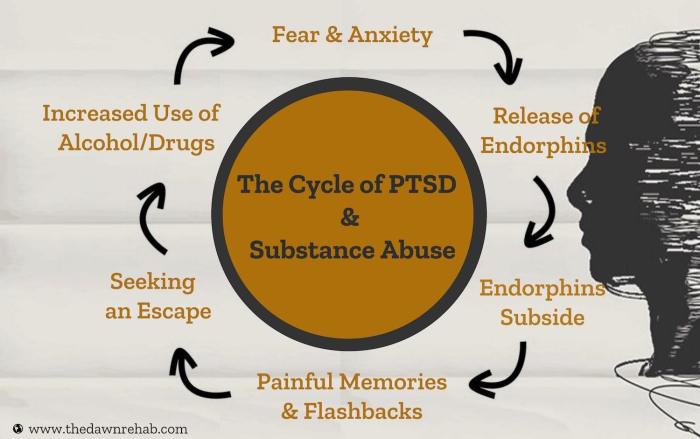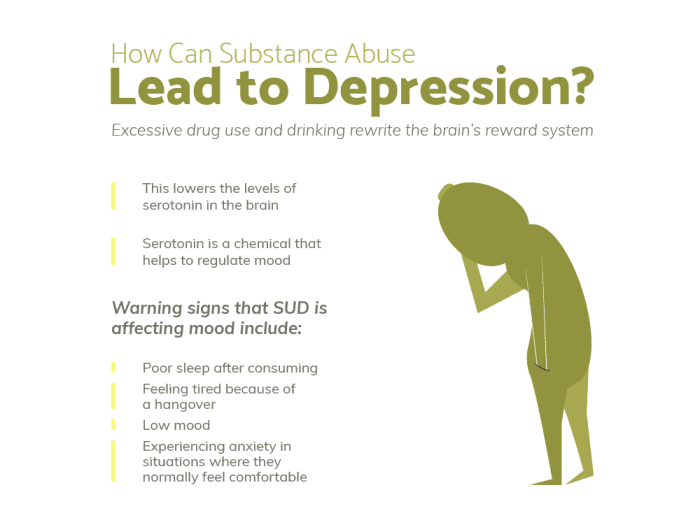Depression and substance use disorders are prevalent and often co-occurring conditions that can have a profound impact on individuals’ lives. Understanding the relationship between these disorders is crucial for effective prevention, diagnosis, and treatment.
The complex interplay between depression and substance use disorders involves biological, psychological, and social factors. Depression can increase the risk of substance use as a coping mechanism, while substance use can exacerbate depressive symptoms and hinder recovery.
Introduction: Depression And Substance Use Disorders

Depression and substance use disorders are two of the most common mental health conditions in the world. Depression is a mood disorder that causes feelings of sadness, hopelessness, and worthlessness. Substance use disorders are characterized by compulsive use of drugs or alcohol, despite negative consequences.
These two disorders often occur together, and they can have a devastating impact on individuals, families, and communities.
Causes of Depression and Substance Use Disorders
The causes of depression and substance use disorders are complex and multifaceted. There are a number of biological, psychological, and social factors that can contribute to the development of these disorders.
Biological factors include genetics, brain chemistry, and hormonal imbalances. Psychological factors include personality traits, coping mechanisms, and life experiences. Social factors include poverty, trauma, and lack of social support.
These factors can interact with each other to increase the risk of developing depression or a substance use disorder. For example, someone who has a family history of depression may be more likely to develop the disorder if they also experience stressful life events.
Symptoms of Depression and Substance Use Disorders

The symptoms of depression and substance use disorders can vary depending on the individual. However, there are some common symptoms that are associated with both disorders.
Symptoms of depression include:
- Sadness
- Hopelessness
- Worthlessness
- Loss of interest in activities
- Fatigue
- Difficulty concentrating
- Changes in appetite or sleep
- Suicidal thoughts
Symptoms of substance use disorders include:
- Compulsive use of drugs or alcohol
- Inability to control drug or alcohol use
- Tolerance to drugs or alcohol
- Withdrawal symptoms when not using drugs or alcohol
- Negative consequences from drug or alcohol use, such as problems at work, school, or relationships
These symptoms can overlap, making it difficult to diagnose depression and substance use disorders.
Treatment for Depression and Substance Use Disorders

There are a number of effective treatments available for depression and substance use disorders. These treatments include medication, therapy, and self-help strategies.
Medication can be used to treat the symptoms of depression and substance use disorders. Antidepressants can help to improve mood and reduce symptoms of depression. Medications can also be used to reduce cravings for drugs or alcohol.
Therapy can help individuals to understand the causes of their depression or substance use disorder and develop coping mechanisms. There are a number of different types of therapy that can be used to treat these disorders, including cognitive-behavioral therapy, interpersonal therapy, and family therapy.
Self-help strategies can also be helpful in treating depression and substance use disorders. These strategies include exercise, healthy eating, and getting enough sleep.
Prevention of Depression and Substance Use Disorders
There are a number of things that can be done to prevent depression and substance use disorders. These include:
- Educating people about the risks of depression and substance use disorders
- Promoting healthy coping mechanisms
- Reducing stigma associated with mental health disorders
- Providing early intervention and treatment for people who are at risk for developing these disorders
These strategies can help to reduce the number of people who develop depression and substance use disorders and improve the quality of life for those who do.
Last Recap
Addressing depression and substance use disorders requires a comprehensive approach that involves tailored treatment plans, prevention strategies, and support systems. By understanding the complexities of these disorders and working collaboratively, we can improve outcomes and promote well-being.
Popular Questions
What are the common symptoms of depression?
Symptoms of depression include persistent sadness, loss of interest in activities, changes in appetite or sleep, feelings of worthlessness or guilt, and thoughts of self-harm or suicide.
How can substance use worsen depression?
Substance use can interfere with neurotransmitters in the brain that regulate mood, leading to worsened depressive symptoms and increased risk of relapse.
What are the effective treatments for depression and substance use disorders?
Effective treatments include psychotherapy, medication, and support groups. Treatment plans are tailored to individual needs and may involve a combination of approaches.